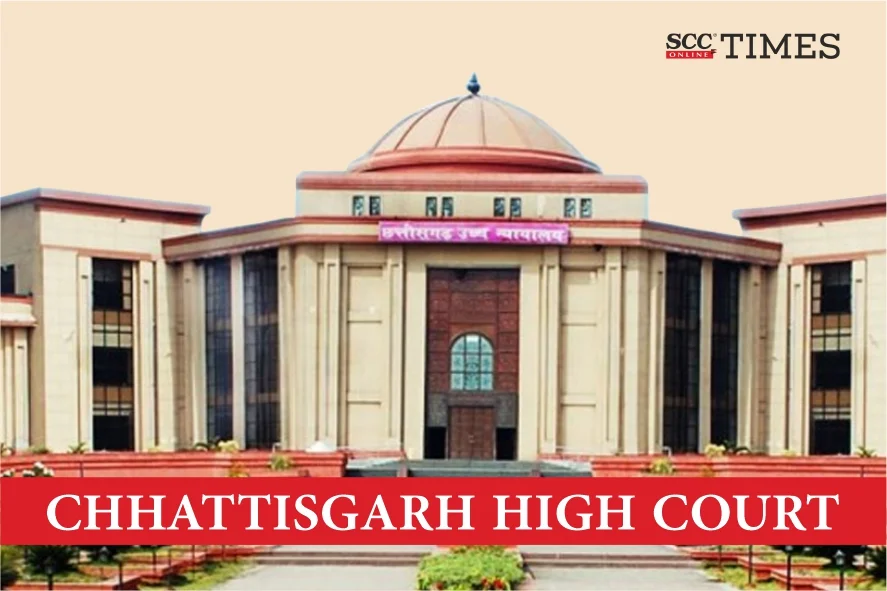Chhattisgarh High Court: In a set of two appeals filed by convicts 1 and 2 challenging their conviction vide the impugned judgment passed by the Trial Court under Section 2011 of the Penal Code, 1860 (‘IPC’) and Sections 376(3)2, 3633, 3024, and 201 of IPC as well as Section 3(2)(v) of the SC and ST (Prevention of Atrocities) Act, 1989 (‘SC-ST Act’) respectively; and a third appeal filed by the deceased’s mother challenging the convict 1’s acquittal for certain other offences, the Division Bench of Ramesh Sinha*, CJ and Bibhu Datta Guru, J., upheld the conviction of the two convicts stating that the prosecution had established their guilt and dismissed the appeal of the deceased’s mother saying that although rape of a dead body was a horrendous act, it did not amount to rape since the victim needed to be alive for such conviction.
Background
The victim’s mother had gone to work, leaving her 9-year-old daughter with her mother at home. When she returned home, she noticed the victim was missing and filed a missing person FIR under Section 363 of IPC. Accordingly, the investigation was conducted, and a chargesheet was filed against convicts under Sections 363, 376(3), 302, 201, 345 of IPC, Section 6 of the Protection of Children from Sexual Offences (‘POCSO’) Act, 2012, and Section 3(2)(v) of the SC-ST Act.
According to the prosecution, convict 2 raped the minor deceased, belonging to the Scheduled Caste community, in her house and then murdered her. Thereafter, he took her body to a hill with the assistance of convict 1, who raped the dead body, before they buried it. After considering the witness statements and evidence, the Trial Court convicted and sentenced the convicts vide the impugned judgment. However, the Trial Court only convicted convict 1 under section 201 and 34 of IPC but acquitted him from the charges under Sections 363, 376 (3) of IPC, Section 6 of the POCSO Act and Section 3 (2) (v) of the SC-ST Act.
Thus, three appeals were filed against the impugned judgment, two by the convicts and one by the deceased’s mother challenging the acquittal of convict 1 by the Trial Court for offences other than the one under Section 201 IPC.
Analysis
After analysing the postmortem report, the Court stated that death of the deceased was undoubtedly a homicide. The Court noted that she was throttled, injured on various parts of her body, and sexually assaulted.
After analysing the witness statements and school records, the Court noted that there was no doubt that the deceased was 9 years old on the date of the incident and fell under the definition of ‘child’ under Section 2(d) of the POCSO Act. The Court also noted that, admittedly, there was no eyewitness to the incident and the entire prosecution case rested upon circumstantial evidence.
Regarding the guilt of the convicts, the Court analysed several witness statements, statements of the convicts, forensic reports of the clothes of the victim and convicts, and DNA report which proved the rape of the victim by the convicts. The Court also noted that the anklets and the undergarment of the victim were recovered at the instance of the convicts from their respective houses.
After such analysis, the Court held that the prosecution had proved beyond doubt that the convicts were the authors of the crime in question. The Court concurred with the reasoning and findings of the Trial Court and dismissed both the criminal appeals filed by the convicts.
Regarding the acquittal appeal filed by the deceased’s mother against the acquittal of convict 1 under the provisions for rape, the Court held that undoubtedly the offence committed by convict 1, i.e., rape of a dead body was one of the most horrendous crimes, however, he could not be convicted under Sections 363, 376 (3) of IPC, Section 6 of the POCSO Act and Section 3(2)(v) of the SC-ST Act because for such conviction under the offence of rape, the victim should be alive.
The Court stated that there could be no disagreement that dignity and fair treatment was not only available to a living man but also to his dead body and every dead body was entitled to respectful treatment, but as per the current law none of the offences, as prayed by the deceased’s mother, could be imposed upon convict 1. Reiterating its agreement with the reasons and findings of the Trial Court, the Court dismissed the acquittal appeal as well.
Holding the above, the Court held that convict 2 would continue to serve his sentence and cancelled the bail of convict 1 while directing him to surrender within 15 days.
[Neelkanth Nagesh v. State of Chhattisgarh, 2024 SCC OnLine Chh 13078, decided on 10-12-2024]
*Judgment authored by Chief Justice Ramesh Sinha
Advocates who appeared in this case:
For the appellant: Advocates Shivendu Pandya, Aman Kesharwani for CRA No. 1920/ 2023 and CRA No. 142/ 2024 respectively, and Dheeraj K. Wankhede for ACQA No. 215/ 2024
For the respondent: Deputy Advocate General Shashank Thakur
1. Section 238 of Bharatiya Nyaya Sanhita, 2023
2. Section 64 of Bharatiya Nyaya Sanhita, 2023
3. Section 137(2) of Bharatiya Nyaya Sanhita, 2023
4. Section 103 of Bharatiya Nyaya Sanhita, 2023
5. Section 3(5) of Bharatiya Nyaya Sanhita, 2023








